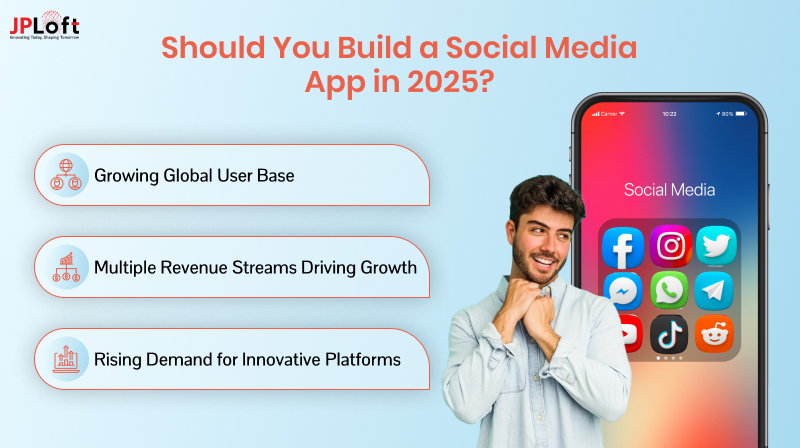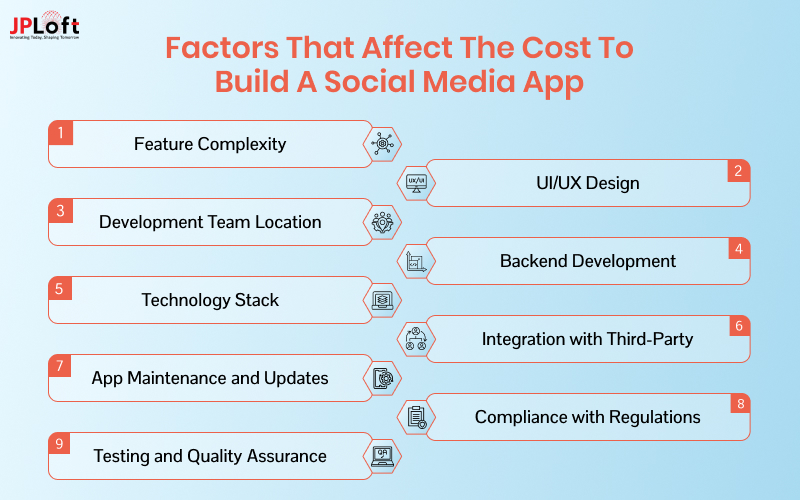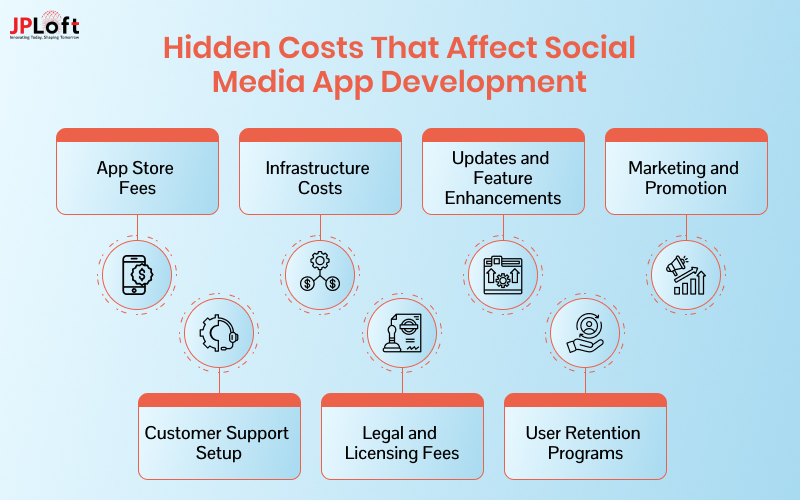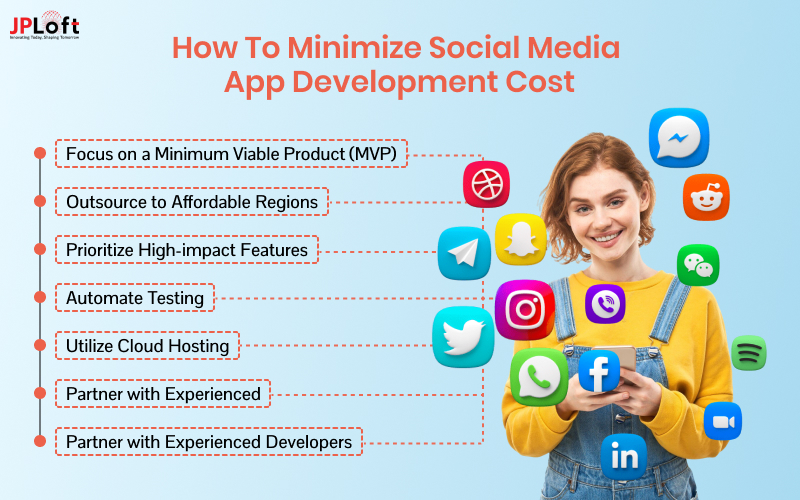Thinking about creating your own social media app in 2025?
You're likely wondering about the investment required.
On average, the social media app development cost ranges between $30,000 and $250,000.
However, the final figure can vary based on several factors, such as features, technology stack, and development team location.
Let’s break it down so you can better understand what goes into this price range, and why it’s worth it.
Should You Build a Social Media App in 2025?
Absolutely!
Here are three compelling reasons why 2025 is the perfect time to dive into social media app development:

1. Growing Global User Base
Social media platforms are showing no signs of slowing down.
By 2025, there will be 5.24 billion people who are using social media platforms, with an increase of 4.1% year on year from 5.04 billion in the year 2023.
Whether you target a general audience or a specific niche, there’s plenty of room for new platforms to capture attention.
The sheer size of the potential user base makes this an ideal time to step into the market.
2. Multiple Revenue Streams Driving Growth
Social media platforms are some of the most profitable digital businesses today, and the trend is only strengthening.
The total revenue of the social networking market is projected to reach US$ 122.60 billion in the year 2022. This revenue is expected to increase to a market volume of US$ 206.76 billion by the year 2029.
With advertising revenues projected to grow by 10% annually, along with rising demand for subscription-based models and in-app purchases, social media apps have become a powerhouse for generating sustainable income.
Launching your app in this growing ecosystem can position you for long-term financial success.
3. Rising Demand for Innovative Platforms
As users grow more tech-savvy, the appetite for platforms offering unique experiences and features is expanding.
Privacy-focused social networks, AI-driven platforms, and apps that prioritize niche communities are rapidly gaining traction.
If your app offers a fresh approach to social interaction, you have the potential to disrupt the market and carve out a loyal audience.
The timing couldn’t be better. If you’ve been contemplating building an app for social media platform now is the time to turn those ideas into action
Average Cost to Develop a Social Media App
Developing a social media app is a substantial investment, with costs typically ranging between $30,000 and $250,000.
This wide range depends on the scope of your project, the features you want to include, and the expertise of the development team you choose.
Here’s a quick look at how the development cost can vary based on app complexity:
|
App Type |
Approximate Cost |
Description |
|
Basic Social Media App |
$30,000 – $80,000 |
Includes essential features like profiles, feed, and messaging. |
|
Advanced Social Media App |
$80,000 – $120,000 |
Adds AI recommendations, AR filters, or live streaming. |
|
Custom Enterprise Social App |
$100,000 – $250,000+ |
High-end customization, AI, blockchain, or advanced security. |
The cost also depends on where you choose to develop your app, as rates for development teams vary by region.
Additionally, investing in a well-designed user interface and robust backend infrastructure ensures your app not only attracts users but also provides a seamless experience, setting it up for long-term success.
Understanding these costs can help you plan your budget effectively while focusing on creating an app that stands out in the crowded social media landscape.
For more details on the same, it’s highly recommended that you consult an app development company.
Factors That Affect the Cost to Build a Social Media App
The cost of social media app development depends on various factors that collectively determine the final budget.

Let’s break down these elements in detail to help you understand where the money goes and how each decision impacts the overall cost.
1] Feature Complexity
The scope and functionality of features directly impact the cost of developing your app. Basic features like user profiles and messaging are relatively affordable.
However, adding advanced features such as AI-driven recommendations or AR filters requires specialized expertise and advanced technologies, which significantly increase costs.
|
Feature Type |
Cost Range |
Details |
|
Basic Features (Profiles, Feed, Messaging) |
$30,000 – $80,000 |
Core functionalities essential for an MVP. |
|
Advanced Features (Live Streaming, AI) |
$80,000 – $120,000 |
High-tech features that elevate user engagement. |
|
Cutting-edge Features (Blockchain, AR) |
$100,000 – $250,000+ |
Complex features requiring expertise and significant time. |
2] UI/UX Design
Custom UI/UX designs make your app visually appealing and easy to navigate but come with additional development time and cost.
Incorporating interactive animations or motion graphics further increases the investment required.
|
Design Type |
Cost Range |
Details |
|
Standard Design |
$10,000 – $20,000 |
Simple and functional designs using templates. |
|
Custom Interactive Design |
$20,000 – $50,000 |
Tailored designs with advanced visuals and interactions. |
|
High-End Motion Graphics |
$50,000 – $100,000 |
Premium designs with animations to enhance user appeal. |
3] Development Team Location
Where your team is located significantly influences the overall cost.
Development rates vary by region, with North America being the most expensive and South Asia being more budget-friendly.
|
Region |
Hourly Rate |
Estimated Cost |
|
North America |
$100 – $200 |
$300,000 – $500,000 for full-scale apps. |
|
Eastern Europe |
$50 – $100 |
$150,000 – $350,000 for similar projects. |
|
South Asia |
$30 – $80 |
$100,000 – $250,000 for cost-effective development. |
4] Backend Development and Scalability
The backend is the foundation of your app, especially for features like real-time updates or large-scale user interactions.
A scalable backend ensures your app can handle high user traffic without crashing.
|
Backend Type |
Cost Range |
Details |
|
Basic Backend |
$25,000 – $50,000 |
Suitable for MVPs with limited user traffic. |
|
Scalable Backend |
$30,000 – $80,000 |
Handles large user bases with high performance. |
|
Cloud-Based Backend (AWS) |
$80,000 – $150,000 |
Offers flexibility and resilience for large-scale apps. |
5] Technology Stack
Your choice of technologies impacts both the functionality and development cost.
While cross-platform tools like Flutter can save time, they may lack the depth of native solutions.
|
Technology Type |
Cost Range |
Details |
|
Cross-Platform (Flutter) |
$50,000 – $150,000 |
Quicker and cheaper but limited to basic functionality. |
|
Native Development (Swift) |
$150,000 – $200,000 |
High performance and tailored user experiences. |
|
Advanced Tech (AI, AR) |
$200,000 – $300,000 |
Premium cost for state-of-the-art technologies. |
6] Integration with Third-Party Services
Third-party APIs can enhance functionality but come with licensing fees and additional development effort.
|
Integration Type |
Cost Range |
Details |
|
Basic Integrations |
$10,000 – $20,000 |
Social login, basic analytics, and payment gateways. |
|
Advanced Integrations |
$25,000 – $50,000 |
Video hosting, cloud storage, and advanced analytics. |
|
Extensive API Ecosystem |
$50,000 – $70,000 |
Multiple integrations for enterprise-grade apps. |
7] App Maintenance and Updates
Ongoing maintenance ensures your app remains functional and secure post-launch. These costs are a recurring part of your budget.
|
Maintenance Type |
Annual Cost |
Details |
|
Basic Maintenance |
$10,000 – $20,000 |
Bug fixes and minor updates for MVPs. |
|
Standard Maintenance |
$20,000 – $30,000 |
Regular updates and performance optimizations. |
|
Advanced Maintenance |
$30,000 – $50,000 |
Proactive scaling, security updates, and feature additions. |
8] Compliance with Regulations
Ensuring your app meets privacy laws like GDPR or CCPA is essential to avoid fines. Implementing these regulations adds to the cost.
|
Compliance Requirement |
Cost Range |
Details |
|
Basic Compliance |
$10,000 – $20,000 |
GDPR or similar regional compliance. |
|
Advanced Compliance |
$30,000 – $35,000 |
Complex industries like healthcare or finance. |
|
Global Compliance |
$35,000 – $80,000 |
Apps catering to international audiences. |
9] Testing and Quality Assurance (QA)
Comprehensive testing is critical to deliver a bug-free experience, ensuring smooth functionality across all devices and operating systems.
|
Testing Type |
Cost Range |
Details |
|
Functional Testing |
$5,000 – $15,000 |
Identifies and fixes core functionality issues. |
|
Performance Testing |
$10,000 – $25,000 |
Ensures the app handles high traffic efficiently. |
|
Security Testing |
$20,000 – $40,000 |
Protects against data breaches and vulnerabilities. |
By understanding these factors and their associated costs, you can better plan your budget and prioritize features for a successful social media app.
Hidden Costs That Affect Social Media App Development – Total Reveal
When estimating the cost to create a social media app, many developers overlook hidden expenses that arise during and after development.
These costs can significantly impact your budget if not accounted for upfront.

Let’s take a closer look at these hidden factors and their potential financial implications.
► App Store Fees
Submitting your app to marketplaces like Google Play Store or Apple App Store isn’t free.
Apple charges an annual developer fee of $99, while Google requires a one-time registration fee of $25.
Additionally, both platforms take a 30% commission on in-app purchases and subscriptions, which can add up as your app scales.
|
Expense |
Cost Range |
Details |
|
Developer Registration |
$25 – $99 annually |
Required to publish the app on Google Play or App Store. |
|
Platform Commissions |
15% – 30% of revenue |
Charged on in-app purchases and subscriptions. |
► Infrastructure Costs
Hosting your app on a reliable server is essential for uninterrupted performance.
While shared servers may suffice for small-scale apps, enterprise-level social media platforms require cloud hosting services like AWS, Google Cloud, or Azure.
These services charge based on storage, bandwidth, and the number of requests, leading to ongoing expenses.
|
Hosting Type |
Monthly Cost |
Details |
|
Basic Shared Hosting |
$50 – $200 |
Suitable for MVPs with limited users. |
|
Cloud Hosting (AWS, Azure) |
$500 – $5,000 |
Scalable solutions for apps with growing user bases. |
|
High-Traffic Hosting |
$10,000+ |
Designed for apps with millions of active users. |
► Updates and Feature Enhancements
Your app isn’t static.
Users expect regular updates, new features, and improvements based on their feedback.
Each update requires development, testing, and deployment, resulting in additional costs.
Enhancing features such as integrating AI or AR after launch can further increase these expenses.
|
Update Type |
Cost Range |
Details |
|
Minor Bug Fixes |
$5,000 – $10,000 |
Quick fixes to improve app performance. |
|
Major Feature Updates |
$10,000 – $50,000 |
Adding significant features or redesigning the interface. |
|
Annual Overhaul |
$50,000 – $100,000 |
Comprehensive updates to stay competitive. |
► Marketing and Promotion
Building the app is just one part of the journey.
Promoting it to reach your target audience involves costs for app store optimization (ASO), digital marketing campaigns, influencer collaborations, and paid advertisements.
Ignoring this expense can make it difficult to gain traction in a competitive market.
|
Marketing Strategy |
Cost Range |
Details |
|
ASO and SEO |
$5,000 – $10,000 |
Improves app visibility in search results. |
|
Social Media Campaigns |
$10,000 – $30,000 |
Paid ads and organic campaigns to drive user acquisition. |
|
Influencer Partnerships |
$10,000+ |
Collaborations with influencers to build credibility. |
► Customer Support Setup
Having a dedicated support team to address user concerns is crucial for user retention.
Whether it’s through live chat, email, or an in-app support system, providing timely assistance requires resources and infrastructure.
|
Support System |
Cost Range |
Details |
|
Basic Email Support |
$5,000 – $10,000/year |
Affordable but slower response times. |
|
In-App Support Tools |
$20,000 – $40,000/year |
Automated tools like chatbots and ticketing systems. |
|
Dedicated Team Support |
$50,000+ annually |
Human representatives for 24/7 support. |
► Legal and Licensing Fees
If your app includes copyrighted content, uses patented technologies, or operates in regions with stringent legal requirements, you may need to budget for legal consultations and licensing agreements.
Failing to comply with these regulations could result in hefty penalties.
|
Legal Requirement |
Cost Range |
Details |
|
Copyright/Patent Licensing |
$5,000 – $20,000 |
Covers usage of proprietary technologies or content. |
|
Legal Compliance Audits |
$10,000 – $50,000 |
Ensures adherence to regional laws like GDPR or CCPA. |
|
Ongoing Legal Retainers |
$10,000+ annually |
Continuous legal support for evolving regulations. |
► User Retention Programs
Retaining users is often more cost-effective than acquiring new ones.
Loyalty programs, referral rewards, and periodic promotions require additional funding to maintain high engagement.
|
Retention Program |
Cost Range |
Details |
|
Referral Rewards |
$5,000 – $15,000 |
Incentivizes users to invite friends. |
|
Loyalty Programs |
$10,000 – $30,000 |
Keeps users engaged with rewards and perks. |
|
Seasonal Promotions |
$10,000+ per campaign |
Boosts activity during key periods. |
Hidden costs can be significant, but careful planning can help you anticipate and manage these expenses effectively.
Accounting for these elements upfront ensures there are no unpleasant surprises later, allowing you to stay on budget while delivering a high-quality social media app.
How to Minimize Social Media App Development Cost Without Compromising Quality
Building a social media app doesn’t have to drain your budget.

By using strategic approaches, you can control costs while maintaining high standards of quality. Here’s how:
♦ Focus on a Minimum Viable Product (MVP)
Instead of creating a fully loaded app from the start, launch with an MVP.
This version includes only the core features such as user registration, profile creation, and messaging.
Not only does this reduce initial costs, but it also allows you to test the waters and refine your app based on user feedback.
MVPs are a cost-efficient way to validate your idea without unnecessary expenses.
♦ Outsource to Affordable Regions
The cost of hiring developers varies widely across regions.
Development teams in South Asia, Eastern Europe, and Latin America offer top-notch skills at competitive rates compared to North America or Western Europe.
Outsourcing to these regions can lower your costs without compromising on quality.
♦ Prioritize High-Impact Features
Not every feature is essential in the early stages.
Prioritize those that are critical for user engagement and monetization, such as a user-friendly feed or in-app purchases.
Save advanced features like augmented reality or AI-based recommendations for later development phases to keep costs manageable.
♦ Leverage Pre-Built APIs and Tools
Developing functionalities like payment processing, social login, or analytics from scratch can be expensive.
Using pre-built APIs or third-party tools for these common features reduces both time and cost, while ensuring reliability.
♦ Automate Testing
Manual testing is labor-intensive and time-consuming.
Automated testing tools can streamline this process, identifying bugs and performance issues more efficiently.
By automating repetitive tasks, you can cut down on costs while maintaining app quality.
♦ Utilize Cloud Hosting
Instead of investing in physical servers, opt for cloud hosting platforms like AWS, Microsoft Azure, or Google Cloud.
These services are scalable, allowing you to pay only for what you use, and save significant infrastructure costs in the long run.
♦ Partner with Experienced Developers
An experienced development team can guide you in making cost-effective decisions, such as selecting the right technology stack and optimizing development processes.
Their expertise can help you avoid costly mistakes and ensure efficient use of resources.
By adopting these strategies, you can effectively manage your social media app development budget while delivering a product that meets user expectations and positions you for success.
Remember, strategic planning and prioritization are key to achieving more with less.
Build Your Social Media App With JPLoft
When it comes to building a social media app that stands out in a crowded market, JPLoft is the development partner you can trust. With a team of seasoned experts and a track record of delivering high-quality applications, we understand the nuances of creating apps that engage users and drive results.
Our end-to-end social media app development services include everything from market analysis and feature planning to deployment and post-launch support. Whether you’re starting with a basic idea or looking to develop a feature-rich platform, we tailor our approach to meet your unique needs.
At JPLoft, we prioritize innovation, user experience, and scalability, ensuring your app performs seamlessly as your user base grows. As a leading social media app development company, we’re here to turn your vision into a reality while keeping costs in check and quality at the forefront.
Ready to build something extraordinary? Let’s make it happen. Contact JPLoft today!
Conclusion
Creating a social media app in 2025 is a promising investment, but understanding the development costs and factors involved is crucial for success.
From deciding on core features to choosing the right development team, every decision impacts the final budget.
By starting with an MVP, leveraging cost-effective tools, and focusing on high-impact functionalities, you can build an app that meets your users’ needs while staying within budget.
FAQs
The cost to develop a social media app typically ranges from $30,000 to $250,000, depending on the features, technology, and development team.
Yes, a basic app with essential features like user registration, profiles, and messaging can start at around $30,000 to $50,000, especially with a cost-efficient development strategy.
Key factors include feature complexity, design, technology stack, development team location, third-party integrations, and post-launch maintenance.
Start with an MVP, use cross-platform development, outsource to cost-effective regions, and leverage pre-built APIs to minimize costs.
The timeline for developing a social media app typically ranges from 6 months to 18 months, depending on the complexity of the project.
JPLoft offers end-to-end development services, cost-effective solutions, and a dedicated team focused on delivering high-quality apps tailored to your needs. Contact us today to learn more!














Share this blog